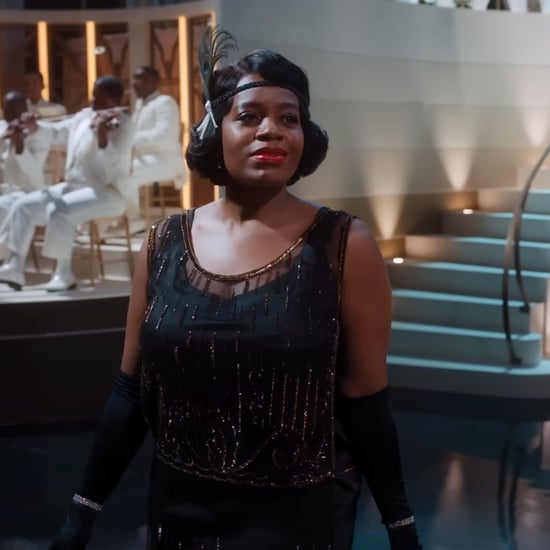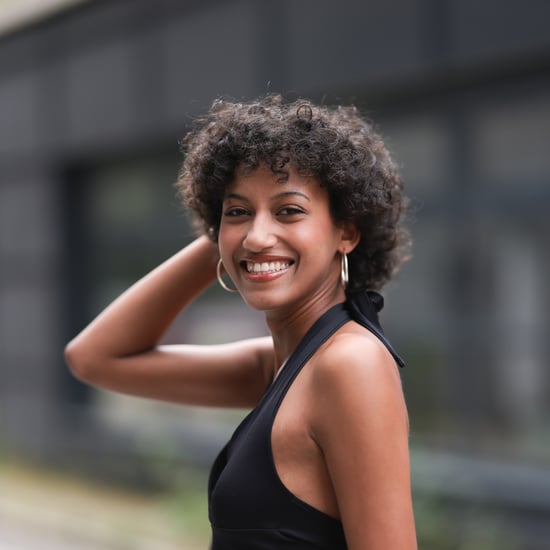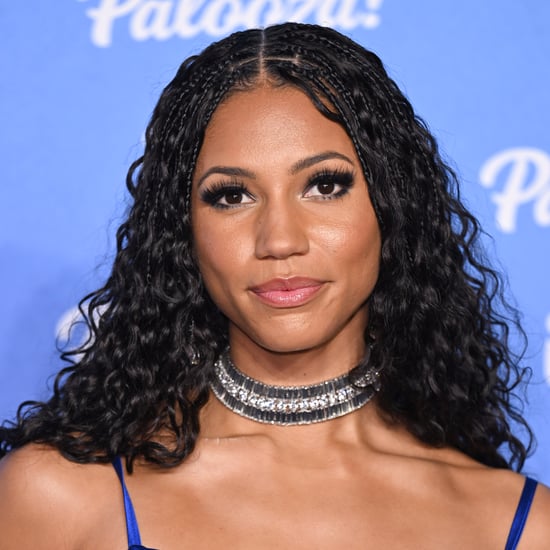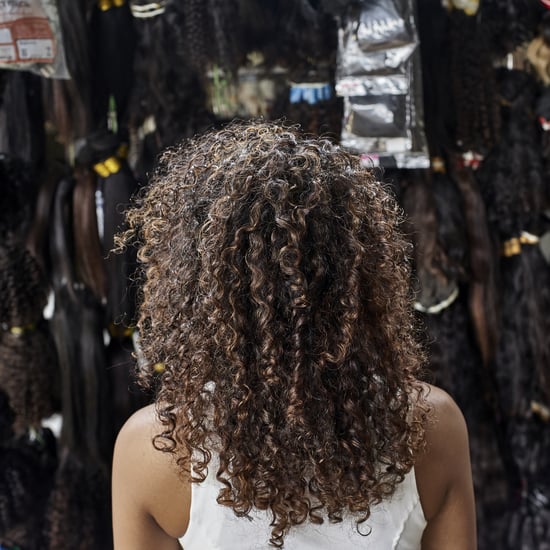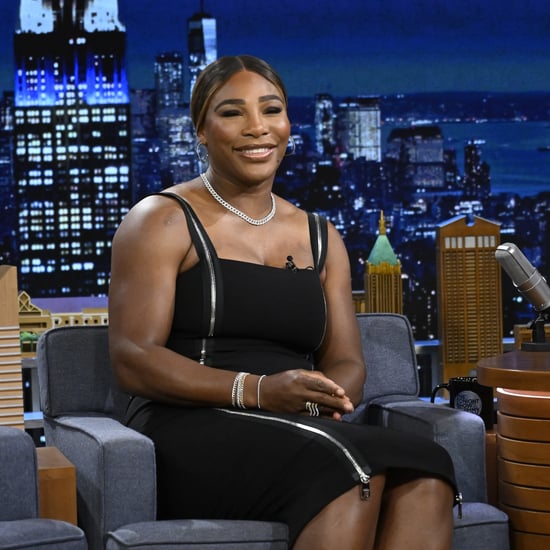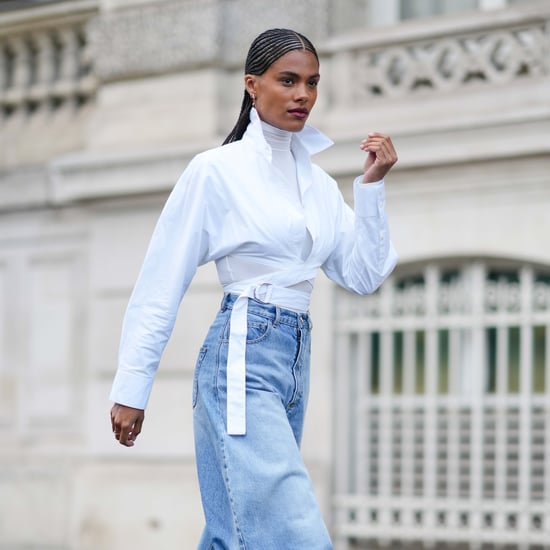Relaxed Hair Has Had a Major Resurgence on Social Media
Relaxed Hair Has Made a Comeback on Social Media, Reigniting a Debate on the Straight Style
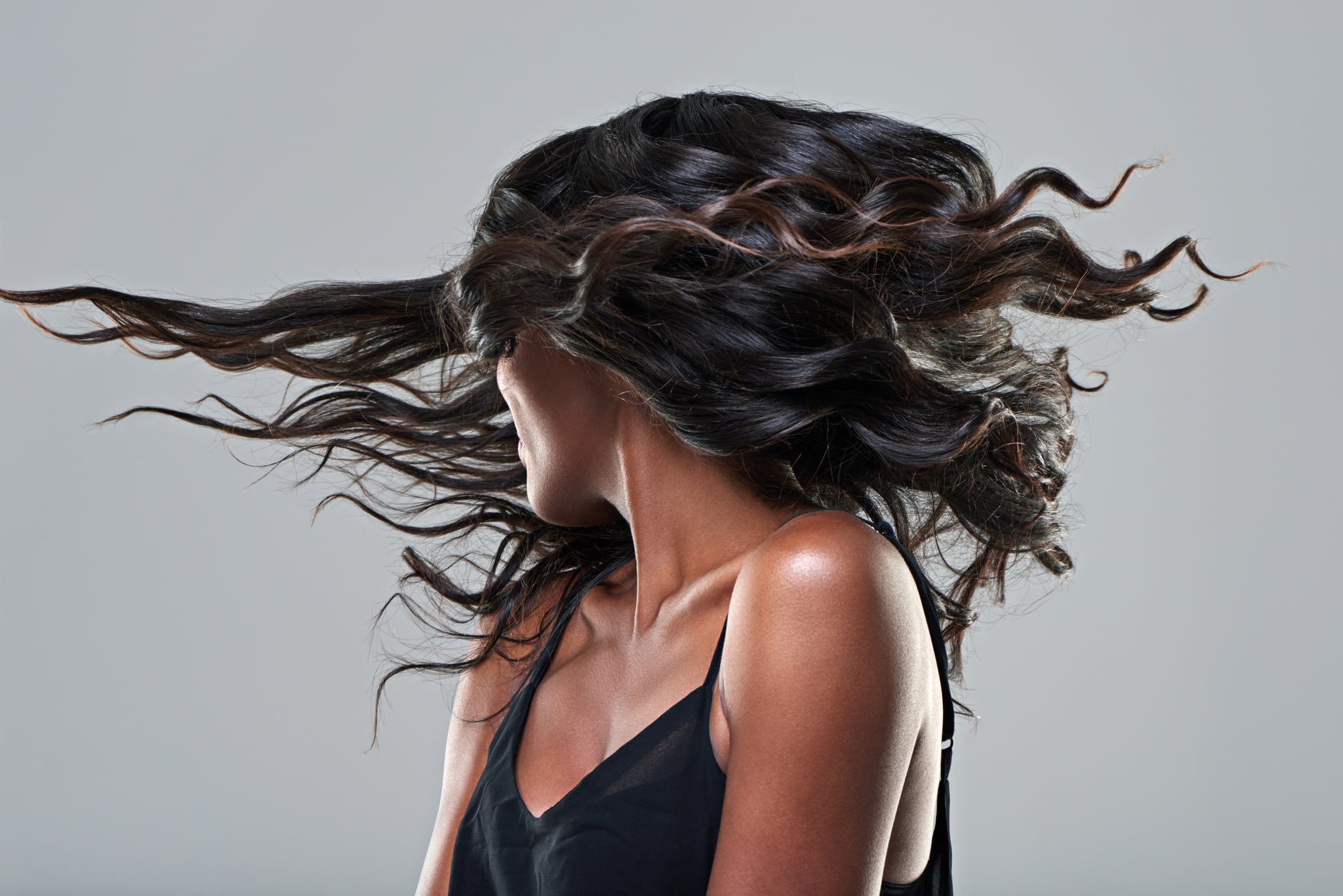
Image Source: Getty / PeopleImages
After years of falling out of favour due to the natural-hair movement, relaxed hair seems to be back by popular demand. With over 47.9 million views on TikTok and 600,000 posts on Instagram, a growing number of women seem to be finding the appeal in reverting their Afro-textured hair back to a chemically relaxed style. For some people, it's because they find relaxed hair easier to maintain and more cost-effective than natural hair; for others, it's because relaxed hair feels less daunting than curating a weekly washday routine and less time-consuming than trying to master some of the natural hairstyles on YouTube. Whatever the reason, scrolling through social media makes it clear that despite its divisive history, relaxer is making an unapologetic return in 2021.
Whilst the resurgence is circulating, relaxers aren't new to the Black hair community. In fact, relaxer was invented in the 1900s, and since then, for better or for worse, it's been been part and parcel of the hairstyle switchup. Let's look back on the style's past — how it came to be and why it can be seen as controversial — as well as how you can relax your hair safely if you're looking to try it out in the present.
A Brief History of Relaxer
In an effort to appease Eurocentric beauty ideals, Black people were straightening their hair decades before relaxer was invented. In the early 1900s, Annie Turnbo, an Illinois native who had expertise in hair care and chemistry, developed her own line of hair products for Black women that included nondamaging hair straighteners, special oils, and hair stimulants. According to an entry by journalist A'Lelia Bundles in Darlene Clark Hines's Black Women in America, the first hot comb was created by a Frenchman, Marcel Grateau, and became popular in Europe and the United States in the 1880s. Madame C.J. Walker — a former selling agent for Turnbo, as well as Bundles's great-great-grandmother — then improved the hot comb with wider teeth, causing its popularity to skyrocket amongst Black women in the early 20th century.
Relaxer was invented by accident in 1909 by Garrett Augustus Morgan. The Black inventor had recently created a new and improved sewing machine and was experimenting with chemical solutions to help ease the friction created by the needle against the fabric. What he noticed was that one of the alkaline solutions he developed caused the fibres of the cloth to straighten. After testing it on animal fur, he then tried it on himself and noticed the same outcome as on the fabric and the fur: the solution chemically altered the curl texture and pattern of the hair fibre so that it was straighter. He quickly established the G.A. Morgan Hair Refining Company and sold his "hair-refining cream" to Black women with great success.
The first lye relaxer wasn't produced commercially until 1971, and came courtesy of Proline, the manufacturer of Dark and Lovely. Up until that point, Black people had always noticed how their hair changed when they washed out the alkaline hair relaxer (like the one invented by Morgan) with lye-based soap (which were most soaps in the early 20th century). Proline's relaxer consisted of sodium hydroxide (lye), water, petroleum jelly, mineral oil, and emulsifiers. A decade later, the first no-lye relaxer was developed by Johnson Products Company after women and hair-care companies noticed the lye-based formulas were seriously damaging hair. By the turn of the century, brands like Soft & Beautiful were creating herbal and botanical options.
The Risks of Relaxers
Over the years, relaxers have been linked to a variety of health concerns, some rooted in science and some not. "There are different types of relaxers, and to the public, they are commonly known as 'lye relaxers' or 'no-lye relaxers'," hairstylist and texture expert April Kayganich told POPSUGAR. "Both use chemicals: lye uses sodium hydroxide, whilst no-lye contains guanidine hydroxide, lithium hydroxide, potassium hydroxide, and calcium hydroxide." Lye is an alkaline chemical that works by penetrating the cortex of the hair shaft and breaking the bonds in the hair, therefore relaxing the curl pattern so strands becomes straight. It can also damage any surface it comes into contact with, including our scalps. Over the years, there has been some research into figuring out just how much damage lye-based relaxers can do.
A "hypothesis-generating study" carried out by the American Journal of Epidemiology aimed to assess hair relaxer use in relation to uterine leiomyomata, also known as uterine fibroids. In a group of 23,580 menstruating Black American women between the years 1997 and 2009, there were 7,146 reported cases of uterine leiomyomata confirmed by ultrasound, with slightly more cases seen in women who used relaxer frequently or for a longer time, or who experienced burns when using it. The findings raised the hypothesis that hair relaxer is associated with an increased risk for uterine fibroids, meaning that more research needs to be done to confirm the link. Still, the chance of any sort of link makes some people understandably nervous. "The part that hit hard for me was that, especially for the younger women, the researcher said that it may have to do with exposure to the chemicals in hair relaxers," explained hairstylist Tiffany Mack.
Examining the link between breast cancer and lye relaxers, researchers at the Boston University School of Medicine conducted a 25-year study and found that whilst there was no association of hair relaxer use with breast cancer risk overall in Black women, there was also some evidence that heavy use of lye-containing hair relaxers may be associated with increased risk of ER+ breast cancer. "Overall, our results are generally reassuring: we found no clear evidence that hair relaxer use is associated with breast cancer risk for most women. However, there was some evidence the heaviest users of lye-containing products — those who used these products at least seven times a year for 15 or more years, which represented approximately 20 percent of women in our study — had about a 30 percent increased risk of [oestrogen] receptor positive (ER+) breast cancer," lead author Kimberly Bertrand, ScD, assistant professor of medicine at Boston University School of Medicine and an epidemiologist at the BU Slone Epidemiology Center, said of the results.
Although more research needs to be done and some factors, like breast cancer correlations, have been ruled out (although it's important to note that the study only concluded that moderate use was not linked to breast cancer cases), there are dermatologists and hairstylists who are still apprehensive to recommend relaxing your hair, not least because of the damage relaxers can do to your natural hair and scalp. "Relaxers and chemicals in them can weaken hair over time, causing lots of breakage and scalp inflammation which can contribute to scarring alopecia or permanent hair loss," Texas-based dermatologist Adeline Kikam, DO, FAAD, told Allure.
What is clear is that more research needs to be done, and the medical implications of relaxer are part of the clarity needed around the miseducation and misinformation that has been issued in the Black community for decades.
@bri.annealexis they’ve been nice but the 4C police? 😩 #relaxedhair #hairtok #chilidogyumplz #relaxedhairjourney #hairgrowthtips
♬ original sound - cropthememe
The Relaxed vs Natural Hair Debate
The controversy around hair relaxer is both medical and cultural. Culturally, relaxer was — and still is in many ways — seen as a shedding of our Afro-textured roots. With Black hair and Black lives historically being controlled by others, reverting back to our natural hair was the way in which we took back control. For some folks, relaxed hair undercuts this.
The conversation dates as far back as the turn of the 20th century. Madame C.J. Walker and her contemporaries received criticism for their beauty offerings, including from American educator and reformer Booker T. Washington, "who worried (to his credit) that hair-straighteners (and, worse, skin-bleaching creams) would lead to the internalisation of white concepts of beauty," literary critic and scholar Henry Louise Gates Jr. wrote. "Perhaps [Walker] was mindful of this, for she was deft in communicating that her dream was not emulative of whites, but divinely inspired, and, like Turnbo's 'Poro Method', African in origin."
"[W]e need to move away from creating elitism within the community and be more understanding of the journeys that people want to take with their hair."
Many conversations have continued amongst Black women and experts over the years. Due to the cultural implications tied to relaxed hair, doing the opposite — embracing your natural texture, that is — also created freedom. However, over the years, this association may have caused friction that then rooted itself in how Black women styled their hair and how it was perceived. "There may be a bit of pushback from the natural-hair community, but we need to move away from creating elitism within the community and be more understanding of the journeys that people want to take with their hair," said Becki Masinja, founder of 4CurlyHair, a natural-hair subscription box.
"In the past, there seemed to be an opinion that not embracing your natural texture was something to be side-eyed at," added Deborah Johnson, co-owner of London hair salon SimplyGorgeous. "But I feel that sentiment has shifted as people have come to realise that how you choose to carry your hair has no reflection on a sense of pride with identity. In fact, we're seeing a lot of previously naturals opting to return to relaxers for various reasons."
If I'm being honest, the actual maintenance and conditioning of natural hair has also come to be glorified. The rules and methods for looking after your natural hair can mean that you are constantly being told to slick, control, refine, lay the edges, and define your curl pattern — and it isn't always viable for everyone. This has been cited as one of the reasons some women have returned to relaxed hair. "I feel relaxers are having a comeback because natural hair can be intimidating. It isn't low-maintenance, and we're living in times where women are juggling a lot more than ever and they don't need their hair to be another job," Mack said.
Masinja agreed: "I'm sure we've all seen memes floating around bringing comedy to caring for natural hair being a full-time job." She isn't wrong. TikTok has a community of women who are tired of having to maintain their natural hair every day with wash and conditioning routines, detangling, shrinkage, the expense of products, and the multitude of treatments and natural hairstyles — they consider the maintenance to be exhausting and taxing. The process of relaxing natural hair takes half the time. After applying the emulsion to protect the scalp, the cream is combed or brushed onto the hair and then followed by a neutralising shampoo that washes out the product. "The reality is that maintaining healthy relaxed hair is also work," Masinja noted.
What You Need to Know If You Want to Relax Your Hair
To avoid breakage or damage, it is important to opt for the best methods that protect and condition your hair. "There has been a vast shift in formulations that are safer than traditional offerings on the market," Johnson said. The safer relaxer options that are recommended by experts are a selection between SoftSheen-Carson no-lye relaxers, Avlon Affirm Sensitive Scalp Conditioning Relaxer, and ORS Olive Oil Professional Crème Relaxer.
"Seek a professional service when relaxing your hair as the damage that can be done by DIY relaxers can take months, if not years, to correct," Johnson explained. "In the same breath, do not relax your hair if you're already experiencing significant breakage; this can create wear on the bonds of the hair, and if they're already compromised, relaxing it will worsen the issue. Avoid relaxing your hair for at least two weeks after a braid takedown or colour processing, and also do not put your hair in braids immediately after having it relaxed."
The Relaxer Verdict
Whilst it is so easy to get caught up in the flexibility, movement, and flow of relaxed hair, it is important to consider both sides, especially if you are seriously considering relaxing your hair. There are potential health risks to consider, and you still have to look after your hair correctly and consider that your hair texture may permanently change. On the other hand, if you want to relax your hair, you shouldn't feel ashamed or judged. The bottom line is that if your hair is healthy, how it looks and how you style it is irrelevant — the emphasis should be on your hair health and happiness, not what anyone else thinks.
